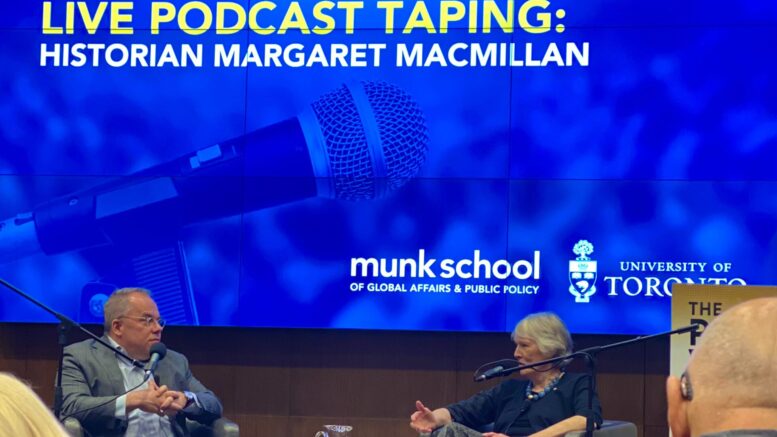Canada best wields power on the international stage as a member of alliances, renowned historian Margaret MacMillan told a live audience in Toronto.
During a taping of the Paul Wells Show at the Munk School of Global Affairs and Public Policy on Jan. 26, the British Order of Merit honouree discussed Canada’s international diplomatic influence — historically, and through the current lens of the Russia-Ukraine war.
“I think we have always been a multilateral power,” she told veteran journalist Paul Wells.
With a large land mass ranking second in the world, the historian emphasized that Canada is also considered “a huge piece of real estate which has things that other people want.”
MacMillan further reflected on Canada’s role in international affairs dating back to once being part of the British Empire.
“We came of age inside the British Empire and then became, I think, an important player within the British Empire,” she said. “Certainly, by the time of the First World War, and in the 1920s and 1930s. So, we’re used to working with larger groupings.”
Following the Second World War and after joining the British Commonwealth as an independent state, Canada became one of the founding members of the North Atlantic Treaty Organization (NATO) in 1949.
This brings about a history that boasts a strong sense of multilateralism that the historian defines as “what we hold in balance against the United States.”
“We played a very important part in founding NATO, we really pushed for that,” she said.
Having progressed towards being empowering towards and being empowered by individual alliances, MacMillan believes that Canada has become an example of power to emulate.
“In that, I think we have sort of an individual power, but I think we have to work within alliances,” she said.
According to the federal government in the fiscal year of 2021-22, in comparison to other NATO members, it was the sixth largest contributor to NATO’s commonly funded budget.
Since Russia’s invasion of Ukraine last February, Canada has contributed $5 billion in overall assistance in support of Ukraine with $1 billion in military support.
Last November, the government vowed to a five-year $500-million Ukraine Sovereignty Bond.

